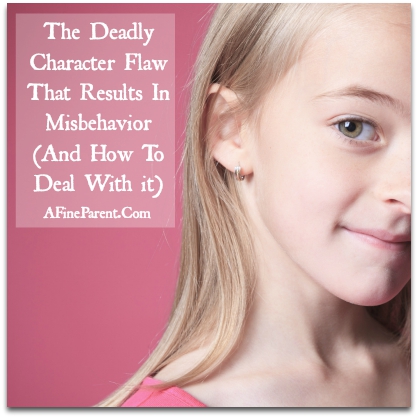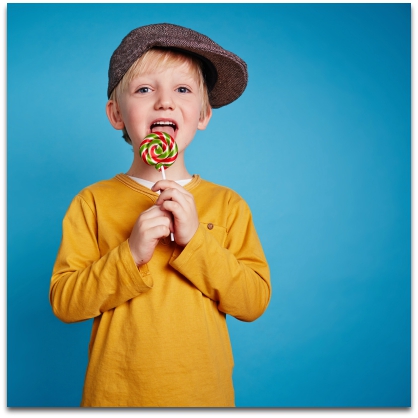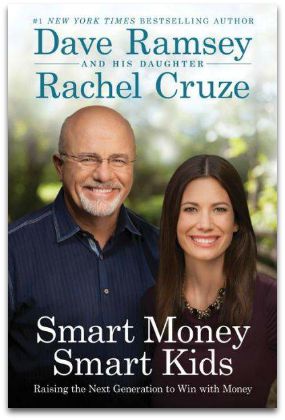 Your kids say “Please” and “Thank you.”
Your kids say “Please” and “Thank you.”
They are kind, considerate and caring (most of the time). They respect others by listening when they’re speaking, and they share and take turns (usually).
You’re feeling pretty capable at this Parenting thing, and the truth is, you’ve done well – considerably well.
And then, you have a play date, and not only you but also your friends and half the neighborhood learns your child’s one defining character flaw.
Don’t worry. You’re still a fine parent, and now, you’ve been given your newest task on this parenthood journey of yours.
Oh, that bloodcurdling scream? That’s just my son.
My son Kenny was six years old the day his legendary growl ripped through the conversation I was having with my friend. We looked up to see him chasing her son down the street.
Horrified, I jumped down from the tailgate and took off after the two boys.
Catching up with my son, I grabbed him around his waist with a tight grip, swung him into my body, and plopped us both safely down on the curb.
He howled while pushing and shoving against me until I thought the blood vessels in his forehead and neck would burst. But, after a few minutes, my tough little guy’s yells and frustration gave way to sobs, and it was over as quickly as it started.
His friend, running wide-eyed back to his parents, obviously wanted to go home, and for good reason.
It isn’t every day that your friend turns into a wild banshee and chases you down the street.
What’s up?
Pride – a deadly character flaw raising its ugly head, both in Kenny AND his friends. That’s what.
As the story surfaced, I learned Kenny’s friend and his friend’s older brother had made fun of him. I can’t remember what it was about, but it punctured Kenny’s pride, and he acted out his rage.
While Kenny’s pride was easy to pinpoint (and hear), his friends’ pride was sarcastic and defensive, which was subtler than Kenny’s, though far from saintly.
After Kenny had settled down, I asked if he was ready to apologize; he wasn’t.
Sadly, he didn’t apologize at all that day, and our friends left early without the boys resolving their issues. I knew that once Kenny began missing his friends, his heart would warm to the thought of apologizing, but I also knew that’d take longer than a day.
It did.
Before it was all over, Kenny’s friends argued, “But it was just a joke.” while Kenny argued, “They made fun of me!”
Pride’s gongs rang loud and clear.
As parents, we prioritize building character into our kids’ lives, so naturally, when we see a character flaw like this, it makes us cringe.
We wonder how many times do we have to repeat the same lesson before our kid gets it?
Of course, you know the answer to that already — as many times as it takes.
The 9 “Faces” of Pride and How to Respond
Once you begin digging, you will find that pride is usually at the foundation of many of your otherwise well-behaved child’s sudden and often unexpected lapses.
Though pride presents itself in many ways, I’ve listed the 9 most repeated ways pride reared its head in my son’s life over the past 7 years and how we responded.
1. Obstinacy
 Obstinacy displays itself differently depending on your child’s personality, but in my strong-willed little man’s life, it is synonymous with inflexibility and stubbornness.
Obstinacy displays itself differently depending on your child’s personality, but in my strong-willed little man’s life, it is synonymous with inflexibility and stubbornness.
Once Kenny makes a decision, he sticks with it.
When he was 2 years old, his obstinate nature played out in our driveway. We had scheduled a park day with friends in the morning, but when we returned home, Kenny refused to get out of his car seat.
Mind you, I could have easily yanked him from his car seat and forced him down for a nap. But I knew naptime would be a disaster, which meant the girls homeschool work would be affected.
So, I parked the Suburban in the driveway, sent the girls in to begin their independent work, and pulled out a book.
Kenny remained in his car seat.
My idea was a gamble. I had no idea how long it would take him to give in, but I knew the girls were safe, and Kenny and I were too.
Every few minutes I asked him if he wanted to go inside.
He made it clear that he did not want to go inside. He wanted to go and play.
I reminded him that everyone had already left the park; we weren’t going to go back and play, and then, I would read again.
The first day we did this, it took an hour.
The second time this happened, it took less time.
The third time, he decided he wanted to go inside as soon as he saw me pull out my book.
That was ten years ago. Kenny is still strong-willed, and sometimes he uses it for good, and other times not. He’s maturing and learning.
I am too.
He takes time to process the information given him, and he comes to conclusions based on those considerations. But once he reaches a decision, persuading him to yield to anything outside of that mindset is still difficult.
We have learned that he needs to think through why he’s wrong and reach a new conclusion in order to implement long-term change. Naturally, this looks different at age 12 than it did at age 2.
2. Sarcasm
I hesitate to call sarcasm a more mature manifestation of pride, but it does require an advanced thought process, so it is a mark of a more developed mindset.
Babies and toddlers aren’t sarcastic. They don’t know how to use wit or irony to cut others down. They get a point across more directly–by screaming.
In our family, we notice sarcasm rooting its head in the early preteen years, around age eight or nine.
When Kenny delays taking out the kitchen trash and one of his sisters take note, they point it out to him.
His replies have been less than complimentary in the past.
“I’ll take the trash out just as soon as I find a bag large enough to fit you.”
And while he thinks he’s clever and does not intend it to be as cutting as it sounds, his goal is to get them to not point out when he’s shirked his chore.
If he were much younger, it’d sound like, “You can’t tell me what to do. You’re not my boss!”
When we hear these exchanges, we call both siblings back into the room for a do-over, which gives Kenny the opportunity to make a more respectful response.
3. Selfishness
 Oh, my goodness, where do I begin?
Oh, my goodness, where do I begin?
Selfishness is the epitome of pride. It’s all about me, me, and…oh yes, me.
Life teaches us the benefits of focusing on others, but while we are young, it is a feat to recognize our selfishness and care about doing anything about it.
When the kids were growing up, we had two different snack times per day.
The early 10:30 a.m. snack was a “healthy snack” because I could not work through lessons with three kids hopped-up on sugar.
The second snack came at 3:00 p.m., and as much as I hated the moniker the kids gave it, that snack time became known as “unhealthy snack time.”
You cannot imagine how I’d cringe to hear, “It’s time for unhealthy snacks!” screamed with such revelry.
Kenny, for whatever reason, always had the best “unhealthy snacks.” He was adept at storing and saving them, but NOT sharing them.
The girls would beg for him to share, trade, or just GIVE them some of his goodies, but he wouldn’t.
We let the natural consequences of his selfishness play out and made sure to vocalize when it affected him later in the day or week.
“She wouldn’t let you have a turn at bat? Probably because she doesn’t want to share time with you when you wouldn’t share your candy with her.”
“She doesn’t want to read your favorite story to you? Probably because she asked you three times for Sour Patch Kids, and you wouldn’t even give her a single one.”
“She didn’t help you clean your side of the room? Probably because earlier today you wouldn’t consider trading a licorice for three Tootsie Rolls.”
Slowly but surely, he began to recognize his generosity “purchased” him favors.
And then, he started feeling good about being less selfish, and that feeling meant more to him than what his sisters would trade with him or do for him later.
4. Defensiveness
In 6th grade, my son believed the world was out to get him. Whether the threat of attack was real or imagined was insignificant; he was ready to protect his ego from any potential harm.
Kenny’s rebuttal of choice was, “So? That’s stupid.”
It was short.
It was impactful.
And though it wasn’t eloquent, it made its mark.
As a parent, you pick your battles. This particular mantra of his became my battle for 24 hours until Kenny would not dare repeat it again to avoid my barrage of questions.
“What do you mean ‘So’? Do you mean, ‘So, I don’t care’ or ‘So, stop talking to me’, or ‘So, I didn’t know that?’”
“And how is it stupid? Can you define stupid? What does stupid have to do with anything?”
With each question, I waited for his response. I listened to the response, and then I formed another question based on the response.
Where he was short, I was long.
Where he had been negatively impactful, I asked him to clarify so I could better understand.
And yes, I feigned ignorance, but he knew it. He understood what was going on, but it took a while for him to let down his defenses and surrender defeat.
In the end, we were laughing.
I said, “So. That WAS stupid.”
And we laughed harder because it was the truth, and he could finally see it.
5. Entitlement
 In the last year, my husband and I switched from giving our kids’ allowances to allowing them to earn commissions based on what we read in Dave Ramsey’s book, Smart Money Smart Kids
In the last year, my husband and I switched from giving our kids’ allowances to allowing them to earn commissions based on what we read in Dave Ramsey’s book, Smart Money Smart Kids.
Kenny wanted to attend multiple summer camps. Jeff and I did not plan on footing the bill 100%. When we clarified that he would need to cover half the cost of whatever camps he wanted to attend, he displayed the depth of his entitlement.
Ramsey writes that the word allowance “implies that a child is ‘allowed’ a certain amount of money just for living and breathing.”
We’ve come to understand that earning potential says, “How can I earn?” and “What can I do for you?”, while entitlement says, “What do I deserve?” and “Why aren’t you doing this for me?”
Since it is unlikely that Kenny’s self-love and self-service (pride) will pay his bills at a later date in life, we want to groom a habit of differentiating between earning potential and entitlement.
6. Volatility
Controlling one’s emotions is a learned behavior. It doesn’t happen overnight and, unfortunately, it’s a lesson learned fastest by failing.
Kenny’s explosive behavior of chasing his friend down the street is the clearest depiction of volatility I can remember.
As Kenny matured, we encouraged him to remove himself from situations where he felt he might lose control. After all, we may not always be present.
And now, with a better repertoire of emotional intelligence tools and more skilled at self-evaluation, he walks away from situations or conversations with friends as needed, even though some parents want to force him to stay and talk it out.
He knows he can’t always manage it effectively until he cools down. We honor this and challenge other parents to see it as a form of self-control.
7. Fearfulness
 Fear is multi-faceted, and there are times when fear is a valuable tool in our life’s belt. There are times fear may drive us to run, or be quiet, stop, hide, and any number of life-saving measures.
Fear is multi-faceted, and there are times when fear is a valuable tool in our life’s belt. There are times fear may drive us to run, or be quiet, stop, hide, and any number of life-saving measures.
I’m not talking about that kind of fear.
The fear I’m talking about stems from pride. It’s debilitating. It’s the kind of fear that says, “I will do whatever I can to keep from embarrassing myself.”
Maybe your child doesn’t reach out to others because they could reject him.
Maybe your child won’t ask forgiveness from someone they’ve wronged because they may not receive it well, and that would hurt her pride.
With my son, it was the final presentation in his American History Part 1 course, and he was concerned that everyone would laugh at him.
“If I stand in front of the entire homeschool class and give that speech, I may mess up and they will all laugh at me.”
We affirmed that he had a point. Yes, the kids might laugh. They do that – especially a class filled with a bunch of nervous kids waiting to give their reports.
Then, we reminded him of the opposite side of the coin. He might not mess up in his speech.
We wanted him to know his fear was valid, but all that mattered was that he did the best he could, and when it was someone else’s turn, instead of jeering at them, he could be their biggest cheerleader!
8. Deviousness
Thankfully, in parenting we are past the dreaded age of “I don’t know,” but for a while, it was a daily occurrence.
“Who cut a hole in the tablecloth?”
Tucking scissors behind his back – “I don’t know.”
“Who broke the (fill in the bank) and didn’t tell me?”
Hiding out in his room – “I don’t know.”
“Who borrowed the screwdriver and didn’t put it back?”
Tonka parts were strewn across the floor – “I don’t know.”
Deviousness is lying. It is saying one thing and knowing another. It’s built on a desire to avoid accountability, and by default, consequences.
When we couldn’t get Kenny to admit he was lying, we simply returned the favor and mimicked his response.
We’d “borrow” something of his and when he came looking for it, “We didn’t know” where it was.
Of course, it had to be meaningful, like his Nintendo or his pocketknife, but he quickly came to realize we were not as foolish as he previously thought, and he’d admit to lying.
9. Arrogance
 Of the many faces of pride, arrogance is the one I dislike the most. It is haughty and ugly. As an aunt of mine would say, “It is putting on ‘airs.'”
Of the many faces of pride, arrogance is the one I dislike the most. It is haughty and ugly. As an aunt of mine would say, “It is putting on ‘airs.'”
Whether arrogant people honestly think they are better than others or not is irrelevant because their behavior reflects a heart that supports the belief.
Kenny is not a child prodigy. He is mostly at his grade level, but when it comes to communicating effectively in the written and spoken word, he excels.
Kenny’s biggest hurdle right now is an understanding that it is unusual for 12-year-old boys to communicate so easily and clearly.
He doesn’t stumble over his words.
And he gets impatient and irritated when others do; so, he is quick to correct his friends or jump in and re-phrase things for them.
His corrections come across as arrogant because…they are. We’re in the midst of working through this right now, but the only way I could even get him to acknowledge he did this was by having friends repeat back to him what he said.
Without that feedback, Kenny couldn’t understand he had a lot of “know it all” in his tone and actions.
But having his friends explain what he said was undeniable. And since he’s sensitive enough not to want to be “that” boy, it gave us a point to work from in helping him alter his behavior.
What’s the saying? “Pride comes before a fall?”
Whether it is subtle or screaming its way down the street for everyone to hear, pride makes relationships difficult and if not nipped in the bud, can have long-term consequences in the lives of our children.
The 2-Minute Action Plan for Fine Parents
It’s time to see how all this applies to you and your family. Take a quick minute to focus on one instance where your child misbehaved in the past week.
- Do you think pride may have been at the bottom of it?
- What was your response?
- If you think pride was at the bottom of it, are you happy with how you responded? If not, how could you respond in a way that both respects your child but also allows him to see the misbehavior for what it was and choose a different action the next time?
- Do you think your pride influenced the way you responded?
The Ongoing Action Plan for Fine Parents
No one knows your child like you. You see things others don’t see – the good, the bad, and the ugly. If you’re anything like me, you also see things in your children that reflect your own behavior.
Before we can build our child’s character, we have to be willing to assess our own. My husband and I often talk about the fact that we feel like we are growing up with our children. They teach us about ourselves. We teach them about themselves. Combined, our family has matured in love and respect for each other.
Take time to consider how your child’s pride may be your pride. Make a list of the 9 faces of pride listed above on a piece of paper. Do you see any of these attributes in yourself? Write them down. If you come up with others, write those down too. Focus on one of them a week. By fostering our personal growth, we often see our positive motion replicated in the lives of our children.
This article provided an interesting perspective on the root of many normal childhood (mis)behaviors. While I enjoyed reading it, I was terribly distracted by reading ONLY examples from the author’s male child of three children. Did the girls not give consent to be mentioned? Did this woman obsess over her son and ignore her daughters? Why was there nothing but stories from the boy? I’m going to have to re-read the article and try to ignore what seems like blatant sexism so I can hopefully learn from the article.
I also felt that some of the ways the parents handled their child’s behavior were indirect at best and manipulative at worst. I can’t imagine “stealing” something of my child’s and pretending I hadn’t stolen it to prove a point. Did they also bite their child in the hopes of teaching him that biting hurts?
Christine – Admittedly, your feedback is a difficult pill to swallow, and I am disappointed that my article read as sexist, indirect, or at best, manipulative. That certainly was never my intention.
It was for the purpose of consistency that I chose to track one child (in this instance, my son) over a period of 7 years.
I clarified this toward the beginning of the post when I wrote:
“Though pride presents itself in many ways, I’ve listed the 9 most repeated ways pride reared its head in my son’s life over the past 7 years and how we responded.”
Yes, we certainly have faced issues of pride in our girls as well as ourselves. I’m not sure any of us can escape it. Even now, it is my pride that wants to defend or explain my intentions when writing this article.
There are many other wonderful articles here in the Building Character series. I hope one of them can make up for what you feel I missed here.
Thank you for your response! I did read the article twice before posting my comment and I didn’t catch that tiny sentence announcing that the examples would be only about your son. That might have helped me be less distracted. My constructive criticism is to use all three children so that future articles are more well rounded.
Also, with regard to my feeling that your parenting techniques seemed too indirect for my taste and could be construed as manipulative, I’m not sure at what age you and your husband chose to steal Kenny’s belongings and then pretend to not know where they were, but I just don’t see that as a direct, non-manipulative technique, especially for younger children.
Thank you for your constructive criticism Christine. 🙂
As they say, “Iron sharpens iron.”
Excellent post, Heather! You always have a wonderful way with words and conveying meaning without being condescending. Thank you! I agree with some other commentators, I recognize many of this in myself.
Hey there misscaron. Thanks for following me over here to read and for your kind words! They are much appreciated!
Thanks for your humble wisdom, but moreover, your gracious responses to your comments as well. High fives all around 🙂
Kari – Where is the *blush* emoticon? Thank you. You words are a sweet encouragement to start the day. Blessings!
Have you read/heard of Dr. Carol Dweck’s research on mindset? She argues that we either have a fixed or growth mindset in many areas of our lives and that if work hard, we can change. Many aspects of “pride” you put forth in your article reflect a “fixed mindset” and not one (yet) of growth.
Grace – I have not heard of Dr. Carol Dweck’s research on mindset, but thank you for bringing it to my attention. I’ll have to Google it. I’m curious if the mindset is at all associated with age/stages of adolescence. I find sometimes I have a fixed mindset when I need to have one of growth!
So timely. I’m a mom who needs to decide to be a mom. What I mean is, it is very natural for me to simply observe my kids, enjoy watching them develop a point of view, see idiosyncrasies play out like their family heritage, their temperament, I find it all rather fascinating. But I have a disciplining job to do! I stumble around doing it in a purposeful way. My approaches are a mess. I never, ever have clarity like this article. Hearing you lay this out is so calming to me, Heather. As in, if some moms know how to do this, then so can I.
Or, at least I can just steal all your cogent, reasoned, practical ideas and implement them around our home. Ha! Thank you!
Janelle – You are not alone. We ALL stumble around. It’s how we find our way. And when we think we’ve nailed it with one child, the next one comes along to prove to us otherwise. Thank YOU for your encouragement, and I too find it fascinating to just sit back and observe at times; well, unless I’m observing something that, as Johnny stated above, is a not-so-sweet reflection of me. Eeek!
It is one of my life’s greatest blessing to walk through this life with you, Jeff. Though I do desire our children to love and serve others, I have to admit, I’ve a long way to go in modeling selflessness. Thanks for being my biggest supporter.
As Heather’s husband, I can say that she has been, and continued to be, an excellent role model for our children.
Pride is not necessarily labeled in our house, but intentionally responded to…For one of our chief goals is to raise selfless, others-centered adults who are focused on giving and supporting others.
Nice explanation of the subtle variations of pride! I really appreciate your redirect techniques and wish I could go back and get a do-over with my kids on some of this. I do think that in our current culture we are so concerned about damaging “self-esteem” that we have unintentionally give pride a deeper root.
And like some of the other readers have commented, I need to examine my own prideful tendencies.
Thanks!!
Thank you, Brenda! I agree with this: “I do think that in our current culture we are so concerned about damaging “self-esteem” that we have unintentionally give pride a deeper root. I realize there is a balance, as in everything, but parenting cannot be sacrificed at the altar of a child’s self-esteem because, in the end, the child suffers. Having a deep and abiding relationship with our children can co-exist with loving discipline.
Wow. Talk about kids providing a clear reflection… My kids have displayed each of these traits, individually, and while reading this I realized that I am guilty of every single one of these and that I have been modelling these behaviors and battling them simultaneously.
Thank you for a well timed lesson in self awareness.
Johnny – “I realized that I am guilty of every single one of these and that I have been modeling these behaviors and battling them simultaneously.” Ouch! That is very true. To some degree, I could flip this post almost completely with the focus on parents. While I haven’t chased anyone down the street growling, I certainly have been guilty of chasing them down with words. Oh my, I need to re-read this post in the same spirit as you. Thank you!
Everything the writer describes sounds like the natural process and progression of growing up. I agree that the behavior needed to be corrected but all the labels and analysis seem a bit zealous. They were being little humans doing what little humans do. I think we as mothers need to be really careful that in our quest to raise decent human beings, that we don’t raise shame based individuals, who are always questioning and second-guessing their own behavior. I agree that the pendulum has swung too far in the other direction and that character education is essential for our children but this goes a bit too far for me. I’ve raised three children in the Bronx New York. They are not perfect people but they are good people. They got good grades , they are honest and loving people, and they are accomplished individuals. One is a graduate of MIT one is a published author and award winning speaker at 20 yrs old and my youngest is a vocal music major at a specialized high school. They also get along very well , with each other. I’m not perfect either but I believe they did well because we established expectations and expected them to be met. Other than that we allowed them to be little humans who worked through the stages of development on their way to emotional maturity , without shaming , labeling or picking their behavior apart.
Tanya – I appreciate your honesty. I do agree that much of what I wrote is “the natural process and progression of growing up.” To be clear, throughout the day, I did not “label” how my children were acting so much as I tried to recognize it internally, and I worked to correct it. Thank you for sharing about your experience and children. It does sound like you found a happy medium and have raised talented young adults.
Is it the pride (arrogance) of parent bloggers that they write so much personal information about their children without their consent?
Donna – I think yours is an important question for parent bloggers, in general. Thank you for asking it. For the purpose of this post, my son did read and approve it before I sent it for publication. That said, I will confess to stepping over the line before in the past and yes, it was selfish of me. It was a hard lesson with multiple ripples. I like to think I’ve learned from it.
Home run with this one! May be my favorite post yet…was scrolling through just to find out what the trait was before heading back up to read in depth. Fantastic, eye-opening piece. Thank you, Heather and Sumitha!
Thank you Ashley. I consider yours a great compliment as each author that publishes here has continued to wow me – including you. Blessings!